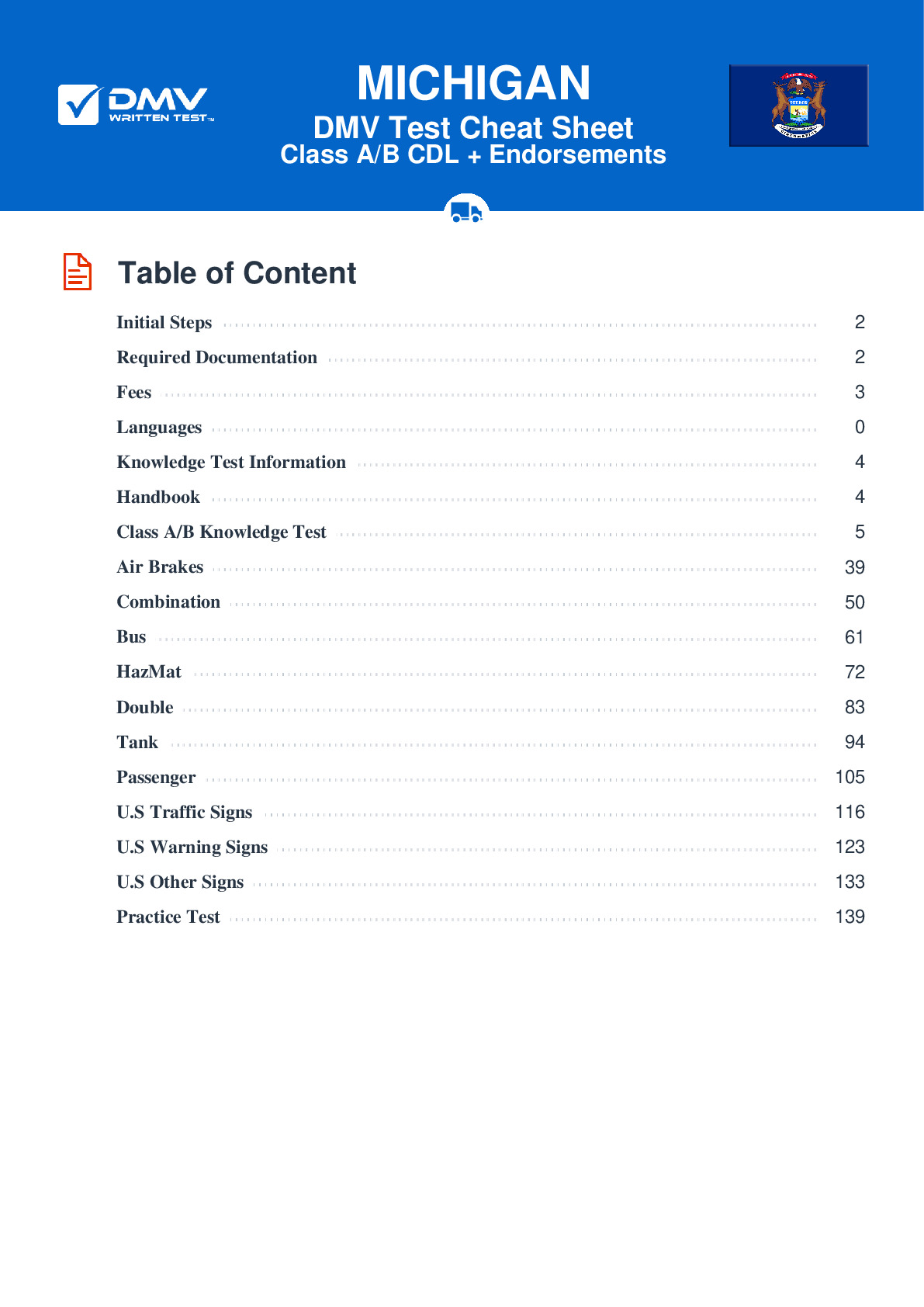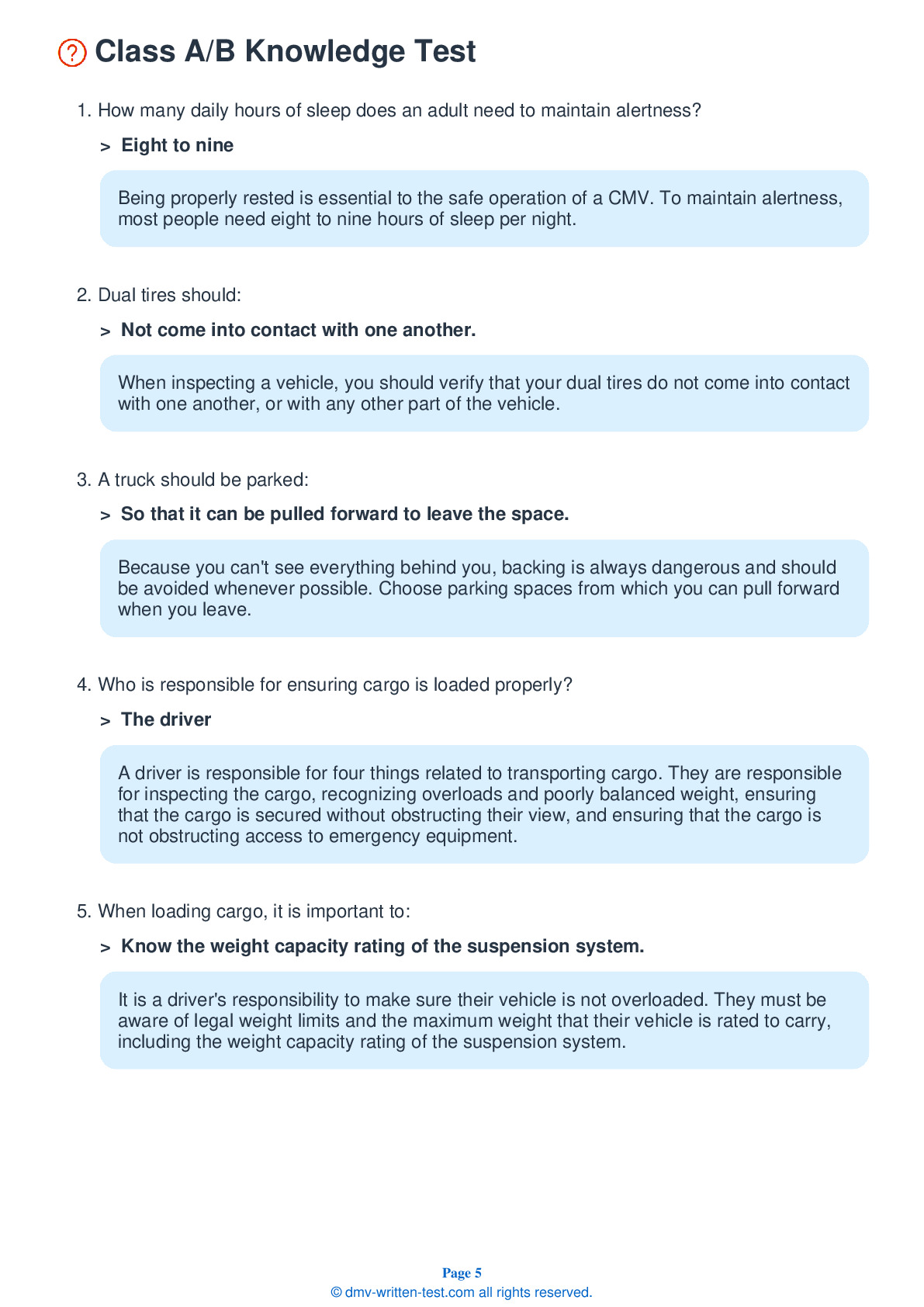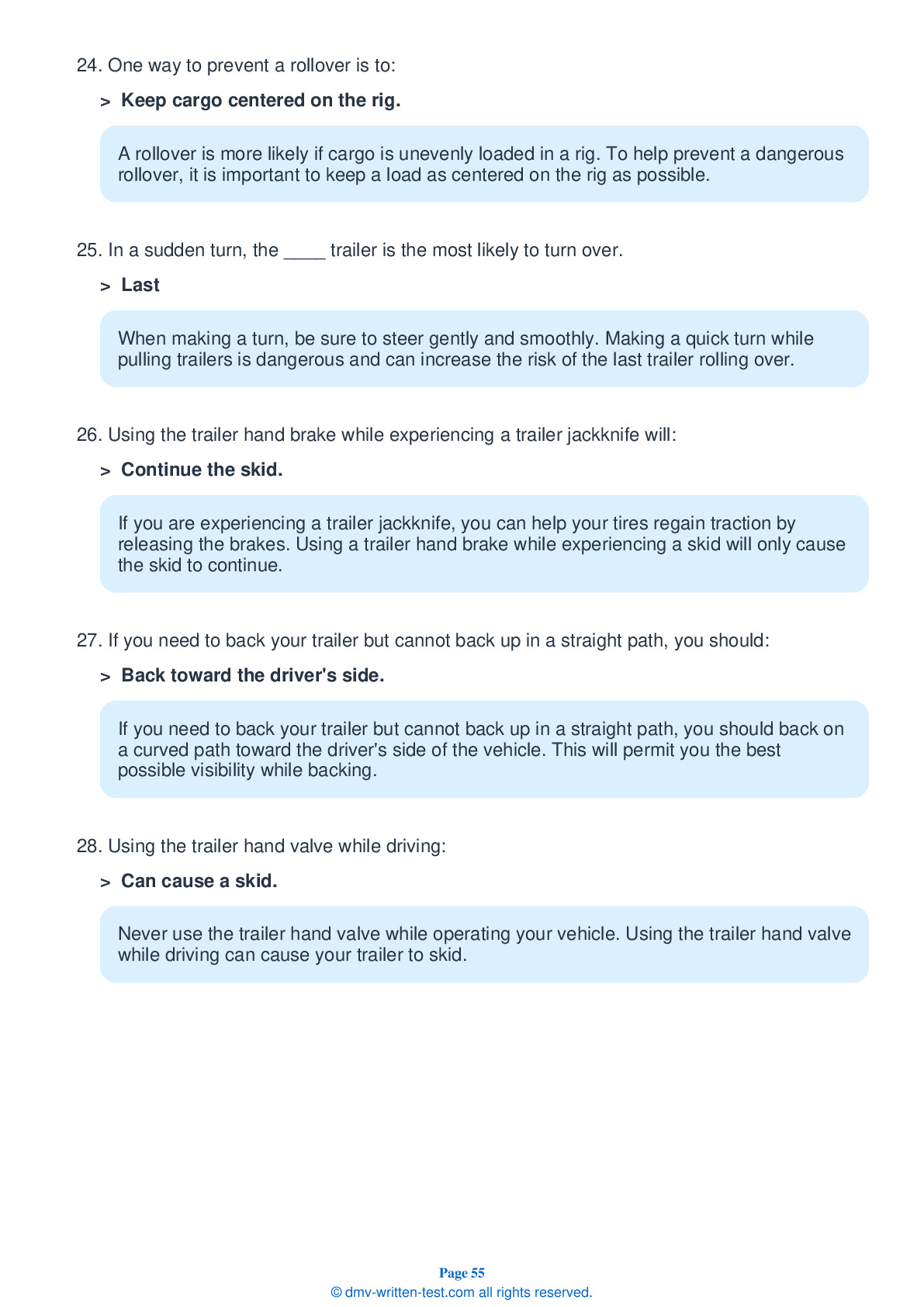Knowledge Test Class A
This license is required for driving any legal combination of vehicles, with a gross combination weight rating of 26,001 pounds or more, provided the GVWR of a trailer exceeds 10,000 pounds. To receive this license, applicants must pass a 50-question test. Test questions come from the Michigan Commercial Driver License Manual. To pass, applicants must answer 40 questions correctly. Each question has four possible answer choices. Questions come from chapters covering: Introduction, Driving Safely, Transporting Cargo Safely, Air Brakes (if applicable), Combination Vehicles, Pre-Trip Vehicle Inspection Test, Basic Vehicle Control Skills Test and On-Road Driving. Endorsements that may be used with a Class A CDL are: Hazardous materials, Tank, Passenger, Doubles/Triples, HazMat, Tank, Air Brakes and School bus.
1. Failing to drain air tanks could result in:
In an air brake system, the air tanks must be periodically drained to remove accumulations of water and compressor oil. If water is not removed, it could freeze in cold weather and cause brake failure.
2. As the driver of a truck carrying a load, you are responsible for all of the following, except:
It is the driver's responsibility to inspect their cargo; recognize overloading or poorly balanced weight; know that the cargo is properly secured and does not obscure the driver's view; and know that the cargo does not restrict access to emergency equipment. The driver is responsible for their cargo even if they were not the one who initially loaded and secured the cargo.
3. When starting an engine, oil pressure should come up to a normal level:
Look at your truck's gauges when starting the engine. The oil pressure in an engine should come up to a normal level within seconds of the vehicle's engine being started.
4. If a vehicle's Anti-Lock Braking System (ABS) is malfunctioning:
An Anti-Lock Braking System (ABS) intervenes to reduce brake pressure if there is a risk of wheel lockup. If the ABS isn't working, the vehicle's basic braking functions are not affected. A driver should continue to drive and brake in a normal manner.
5. When loading cargo, weight should be placed:
A vehicle is vulnerable to tipping over if its center of gravity is too high. To prevent this, you should distribute the weight of your cargo evenly and as low as possible.
6. Alcohol can be removed from your system:
The liver removes alcohol from the body at a fixed rate, so the only way to sober up after consuming alcohol is to allow your body time to remove the alcohol on its own.
7. If there is a fire in your vehicle, you should not:
In the event of a vehicle fire, you should leave the road and stop in an open area. Do not pull into a service station as fuels at the service station could catch fire. Report the fire and your location to emergency services.
Frequently Asked Questions
To obtain a Class A CDL license in Michigan, you must first pass a written knowledge test, followed by a skills test that includes a pre-trip inspection, a basic controls test, and an on-road driving test. Additionally, you must meet certain medical and residency requirements and be at least 18 years old (21 years old for interstate driving).
Examples of combination vehicles that can be operated with a Class A CDL license in Michigan include tractor-trailers (also known as semi-trucks), tanker vehicles, livestock carriers, and flatbed trucks with attached trailers.
It's important to note that if you have a Class A CDL license, you are also authorized to operate vehicles that require Class B and C licenses. However, if you only have a Class B or C license, you are not authorized to operate vehicles that require a Class A license.
1. Age: You must be at least 18 years old to operate commercial vehicles within the state of Michigan, and 21 years old to operate commercial vehicles outside of Michigan.
2. Residency: You must be a resident of Michigan or be employed by a Michigan-based company.
3. Medical certification: You must pass a Department of Transportation (DOT) medical exam and obtain a medical certificate from a licensed medical examiner.
4. Knowledge test: You must pass a written knowledge test that covers topics such as driving safety, vehicle inspection, and hazardous materials regulations.
5. Skills test: You must pass a three-part skills test that includes a pre-trip inspection, basic vehicle controls, and an on-road driving test.
6. Background check: You must undergo a background check that includes your driving record and criminal history.
7. Payment: You must pay the required fees for obtaining a commercial driver's license in Michigan.
It's important to note that additional endorsements may be required for certain types of commercial vehicles, such as hazardous materials or passenger transport vehicles.
It's important to note that certain types of commercial vehicles may have additional age requirements. For example, drivers who transport hazardous materials must be at least 21 years old. Additionally, some employers may have their own age requirements for commercial drivers.
1. Hazmat endorsement: This endorsement is required if you plan to transport hazardous materials.
2. Tanker endorsement: If you plan to haul liquid or gas in bulk, you will need a tanker endorsement.
3. Double/triple trailer endorsement: This endorsement is required if you plan to pull double or triple trailers.
4. Passenger endorsement: If you plan to transport more than 16 passengers at a time, including the driver, you will need a passenger endorsement.
5. School bus endorsement: If you plan to drive a school bus, you will need a school bus endorsement.
6. Combination of tank and hazardous materials endorsements: This allows drivers to transport both hazardous materials and liquids or gases in bulk.
To obtain an endorsement, you must pass an additional knowledge test specific to the type of cargo or vehicle you will be transporting. Additionally, some endorsements may require additional skills tests or background checks.
1. Pre-trip inspection: You will be asked to do a thorough inspection of the vehicle before starting the engine, identifying any potential safety hazards or mechanical issues.
2. Basic vehicle control: You will be evaluated on your ability to control the vehicle in a variety of situations, including straight-line backing, turning, shifting gears smoothly, and maneuvering in tight spaces.
3. On-road driving: You must demonstrate your ability to operate the commercial vehicle safely on public roads, obeying all traffic laws while navigating through different driving conditions.
During the skills test, you will be evaluated by a certified examiner who will score you on each part of the test. In order to pass the skills test, you must obtain a passing score in each section. If you fail any part of the test, you may be required to wait a certain amount of time before attempting that portion again. It's important to note that before taking the skills test, you must pass a knowledge test and obtain any necessary endorsements for the type of commercial vehicle you plan to operate.
1. Air brakes restriction: If you did not pass the air brakes knowledge test or the skills test in a vehicle equipped with air brakes, you will have an air brakes restriction on your CDL.
2. Manual transmission restriction: If you take the skills test in a vehicle with automatic transmission, you will have a restriction on your CDL that prohibits you from operating a commercial vehicle with a manual transmission.
3. Intrastate-only restriction: If you only plan to operate commercial vehicles within Michigan, you will have an intrastate-only restriction on your CDL.
4. Medical variance restriction: If you have a medical condition that requires a medical variance, you will have a restriction on your CDL that limits your driving to the terms of your medical variance.
5. No tractor-trailer restriction: If you pass the skills test in a Class B vehicle, you will have a restriction on your CDL that prohibits you from operating Class A tractor-trailer combinations.
It's important to understand any restrictions or limitations on your CDL as they may impact your ability to work for certain employers or operate certain types of commercial vehicles.
It's important to note that while an interpreter can assist you with translation during the written test, they cannot help you with the actual test questions or provide any additional information beyond translation. If you need assistance understanding the content of the test, it may be helpful to study with materials available in your preferred language before taking the test.
If you have any questions or concerns about taking the Class A CDL written test in a language other than English, it's recommended that you contact your local Secretary of State branch office for more information.
To request accommodations, you will need to complete the Request for Accommodations (Form BDVR-153) and submit it to your local branch office of the Secretary of State. The form requires detailed information about your disability and the accommodations you are requesting.
Some examples of accommodations that may be available include extended testing time, a private testing area, a reader or scribe to assist with the test, or an alternative format for the test.
It's important to note that you will need to provide documentation of your disability from a qualified professional in order for your request to be considered. The documentation must describe how your disability impacts your ability to take the Class A CDL written test and provide recommendations for appropriate accommodations.
If you have any questions or concerns about requesting accommodations for the Class A CDL written test, it's recommended that you contact your local Secretary of State branch office for more information.
If you fail the written test three times within a two-year period, you will be required to wait six months before retaking the test. Additionally, if you fail the written test six times within a two-year period, you will be required to wait one year before retaking the test.
It's important to note that each time you take the written test, you will need to pay a fee. Therefore, it's recommended that you study and prepare thoroughly before taking the test to increase your chances of passing on the first attempt.
If you have any questions or concerns about retaking the Class A CDL written test in Michigan, it's recommended that you contact your local branch office of the Secretary of State for more information.




